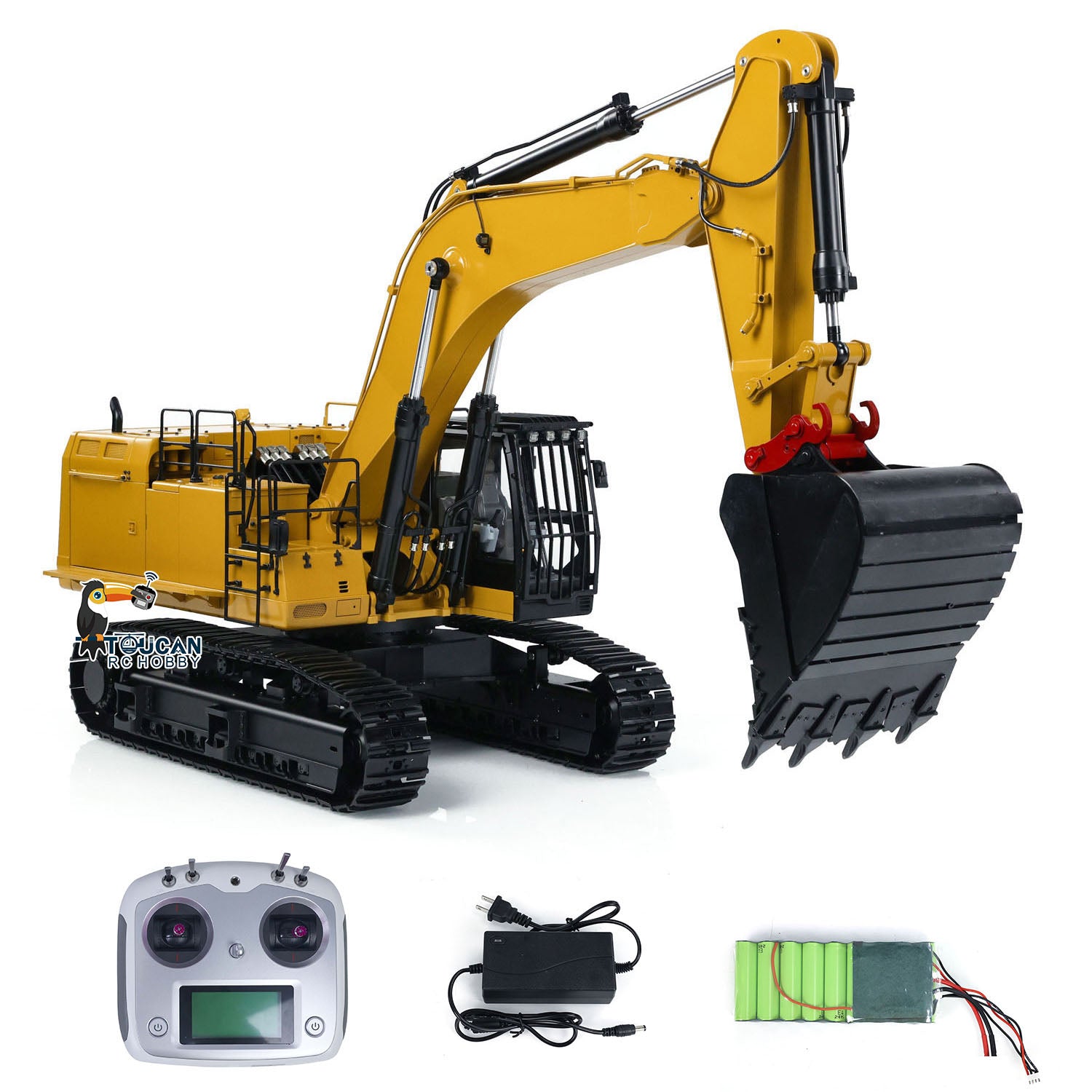Understanding the Role of a rc excavator in Large-Scale Construction Projects
Discover the Significance of Excavator in Modern Building Projects
Excavators are important devices in contemporary building projects. Their adaptability permits them to perform a vast array of tasks, from digging and grading to demolition and site prep work. Advanced attributes, such as hydraulic attachments and GPS, improve their capacities and performance on job websites. As the industry develops, the importance of excavators grows also a lot more. Recognizing their duty can reveal insights into the future of building techniques. What lies ahead for these devices?
The Convenience of Excavators in Numerous Projects
Excavators are commonly connected with massive building projects, their flexibility permits them to be utilized in a wide array of applications, from household landscape design to utility maintenance. In urban setups, excavators can browse tight spaces to dig structures for homes or set up drain systems. Their ability to perform fragile jobs makes them optimal for landscape design tasks, where they can dig deep into for ponds or plant trees. Furthermore, excavators play an essential duty in energy maintenance, successfully excavating trenches for pipelines or cables without interfering with surrounding areas. In agricultural applications, they assist in land clearing up and soil preparation. Additionally, their versatility enables them to be equipped with various accessories, improving their capability across various tasks. This complex nature of excavators not only simplifies numerous building procedures however likewise demonstrates their indispensable role in contemporary facilities development and upkeep.
Key Attributes and Sorts Of Excavators
The discussion on crucial attributes and kinds of excavators highlights the essential characteristics that make these equipments very useful in building. Various excavator types, each made for particular jobs, demonstrate their convenience and efficiency throughout different applications. rc excavator. Comprehending these functions and categories is crucial for enhancing their usage in contemporary construction projects
Excavator Types Summary
Excavators play a pivotal function in modern-day building and construction, offering versatility and performance across numerous tasks. These heavy equipment systems can be found in numerous types, each tailored for specific applications. One of the most usual types include crawler excavators, recognized for their stability on unequal terrain, and rolled excavators, which offer better mobility on paved surface areas. Mini excavators are favored for small tasks and limited rooms, while long-reach excavators are created for deep excavating. Additionally, there are specialized excavators, such as hydraulic excavators, which improve power and accuracy. Each kind includes distinct abilities, making them important for jobs ranging from excavating and grading to demolition and material handling. Understanding these variations permits building and construction specialists to pick the right excavator for their project requires.
Trick Features Explained
Comprehending the vital functions of excavators boosts their reliable application in construction jobs. Excavators are characterized by their effective hydraulic systems, which supply the needed pressure for digging, lifting, and moving materials. Their verbalized arms permit a variety of motion, facilitating exact operations in constrained spaces. Additionally, the selection of accessories, such as buckets, grapples, and augers, expands their convenience to fulfill different job demands. The dimension and weight of excavators also contribute to their stability and maneuverability on different terrains. Moreover, improvements in modern technology have actually led to the combination of GPS and automation, boosting precision and effectiveness in excavation tasks. These functions collectively position excavators as crucial tools in contemporary construction.
Applications in Building
Transforming building and construction websites, excavators play a crucial duty across various applications, ranging from household structure projects to massive infrastructure developments. These versatile makers are geared up for tasks such as excavating foundations, trenching for utilities, and site grading. Different kinds of excavators, consisting of spider, rolled, and mini excavators, give specific advantages tailored to the task needs. Crawler excavators master harsh surfaces, while wheeled excavators supply mobility on paved surface areas. Mini excavators are suitable for confined rooms, making them popular in city setups. The effectiveness and power of excavators substantially quicken construction procedures, making sure prompt task conclusion. Their adaptability further enhances their importance, allowing construction groups to deal with a varied range of obstacles efficiently.
Enhancing Effectiveness and Efficiency on Job Sites
Maximizing performance and productivity on job sites is a vital purpose in modern-day building. Excavators play a pivotal role in accomplishing this goal by improving various tasks. Their capability to do several functions-- such as lifting, digging, and grading-- lowers the need for additional equipment, thereby saving time and resources.Moreover, excavators improve operations by permitting faster conclusion of tasks. With sophisticated attributes like hydraulic accessories and general practitioners modern technology, they can carry out specific operations that reduce mistakes and revamp. This accuracy not only improves the quality of job however also maximizes product usage, adding to set you back savings.The versatility of excavators allows them to adjust to various website conditions, making certain that tasks advance smoothly despite obstacles. By incorporating excavators into construction processes, groups can greatly improve their total efficiency, bring about prompt job completion and enhanced earnings.
Safety Advantages of Utilizing Excavators
Excavators substantially improve security on building and construction sites via boosted operator presence and lowered manual work dangers. By supplying drivers with a clear view of their surroundings, excavators assist to prevent injuries and mishaps. Additionally, the machinery lessens the need for workers to engage in dangerous hands-on tasks, additionally advertising a much safer job environment.
Boosted Operator Exposure
Although building and construction websites can be disorderly and loaded with potential dangers, improved operator exposure plays an important function in guaranteeing safety and security when using excavators. Modern excavators are created with big, unblocked home windows and tactically positioned mirrors, allowing drivers to preserve a clear view of their environments (rc excavator). This enhanced visibility is critical for identifying pedestrians, various other equipment, and numerous obstacles, significantly decreasing the danger of accidents. In addition, many excavators include advanced technology, such as video cameras and sensors, to give operators with additional viewpoints, better enhancing recognition. The ability to see even more clearly not only help in efficient procedure yet additionally cultivates a much safer work atmosphere, making it less complicated for drivers to navigate complex building websites without endangering security requirements
Lowered Manual Work Risks
When manual work is decreased through making use of excavators, countless security benefits emerge, significantly enhancing the health of building employees. Excavators reduce the physical pressure linked with hefty lifting and recurring tasks, properly reducing the threat of musculoskeletal injuries. By automating processes such as digging, grading, and moving products, they enable workers to preserve a more secure range from possible dangers. In addition, excavators are geared up with sophisticated safety and security functions, such as rollover protection systems and enhanced operator ergonomics, which even more secure workers on website. The result is a considerable decrease in office mishaps and injuries, leading to enhanced productivity and spirits amongst building groups. Ultimately, the adoption of excavators contributes to a more secure and much more reliable building and construction setting.
Excavators in Earthmoving and Site Prep Work
In contemporary building, a significant section of earthmoving and site preparation jobs counts on the effectiveness and adaptability of excavators. These devices are designed to take care of numerous soil types and terrain, making them vital for grading, digging, and trenching tasks. Their hydraulic arms can be furnished with various attachments, such as augers and containers, permitting operators to customize their method based upon particular job requirements.Excavators stand out at relocating huge quantities of planet rapidly and successfully, which accelerates the total building timeline. They can browse tight rooms and testing websites where conventional tools may struggle, improving efficiency. In addition, the accuracy of excavators warranties that site prep work sticks to rigorous requirements, minimizing the threat of mistakes that might result in costly rework.
The Function of Excavators in Demolition Tasks
Excavators play a crucial role in demolition jobs, as they have the power and dexterity required to take apart structures successfully. Equipped with various accessories such as hydraulic breakers, shears, and grapples, these machines can adjust to various demolition rc excavator needs, whether for small structures or big commercial websites. Their adaptability makes it possible for drivers to tackle complex projects while keeping security and precision.In addition to their demolition capacities, excavators promote debris elimination, ensuring that job websites stay orderly and secure. By damaging down frameworks right into workable pieces, they allow for streamlined cleaning and recycling of materials, aligning with contemporary sustainability efforts.Moreover, excavators can access limited spaces and navigate uneven terrain, making them crucial in urban demolition jobs. On the whole, their durable design and multifunctionality make excavators a crucial asset in the demolition phase of construction, contributing significantly to job timelines and efficiency.


Future Trends in Excavator Technology and Use
As the building market evolves, improvements in excavator technology are poised to change their use and efficiency markedly. One considerable fad is the integration of automation and man-made intelligence, allowing excavators to run with very little human intervention. This shift will certainly boost accuracy in jobs such as grading and trenching, minimizing human error and enhancing productivity.Additionally, the rise of electrical and hybrid excavators is shaping a more sustainable building and construction atmosphere, decreasing carbon exhausts and gas expenses. Improved telematics systems are also arising, allowing real-time monitoring of device efficiency and maintenance demands, which can bring about much better operational effectiveness and longer equipment lifespan.Moreover, advancements in add-on innovation are expanding the convenience of excavators, allowing them to execute a wider array of jobs. The mix of these patterns shows a future where excavators are smarter, greener, and much more versatile, eventually improving building task characteristics.
Frequently Asked Inquiries
How Do Excavators Contrast to Other Building Equipment?
Excavators, defined by their versatility and power, stand out in excavating and earthmoving compared to various other equipment. Their ability to do various tasks, consisting of lifting and demolition, makes them essential in building and construction projects, improving general performance.

What Is the Average Life Expectancy of an Excavator?
The average life expectancy of an excavator usually ranges from 7,000 to 10,000 operating hours, depending upon upkeep, use problems, and design. Correct treatment can extend this life-span, ensuring peak efficiency throughout its functional years.
How Are Excavators Kept for Ideal Efficiency?
Excavators require routine upkeep for peak efficiency, including routine examinations, fluid checks, filter replacements, and timely repair services. Applying a precautionary upkeep schedule assists extend their lifespan and guarantees effective procedure in various building atmospheres.
What Are the Prices Connected With Leasing vs. Getting an Excavator?
The expenses connected with getting an excavator versus renting vary significantly. Leasing offers lower upfront costs however can collect with time, while acquiring requires a considerable preliminary financial investment, however gives long-term savings and asset ownership advantages.
What Training Is Needed to Run an Excavator?
Running an excavator requires specialized training, typically including security procedures, device procedure techniques, and environmental recognition. Certification programs typically mandate functional experience, allowing operators to handle various jobs successfully while making sure compliance with industry regulations. The most usual kinds include spider excavators, understood for their stability on irregular surface, and wheeled excavators, which offer greater flexibility on paved surfaces. Miniature excavators are favored for tight rooms and small projects, while long-reach excavators are made for deep digging. Additionally, there are customized excavators, such as hydraulic excavators, which improve power and precision. Different kinds of excavators, including spider, wheeled, and mini excavators, give certain advantages customized to the project needs. Crawler excavators succeed in rough surfaces, while rolled excavators supply wheelchair on paved surface areas.